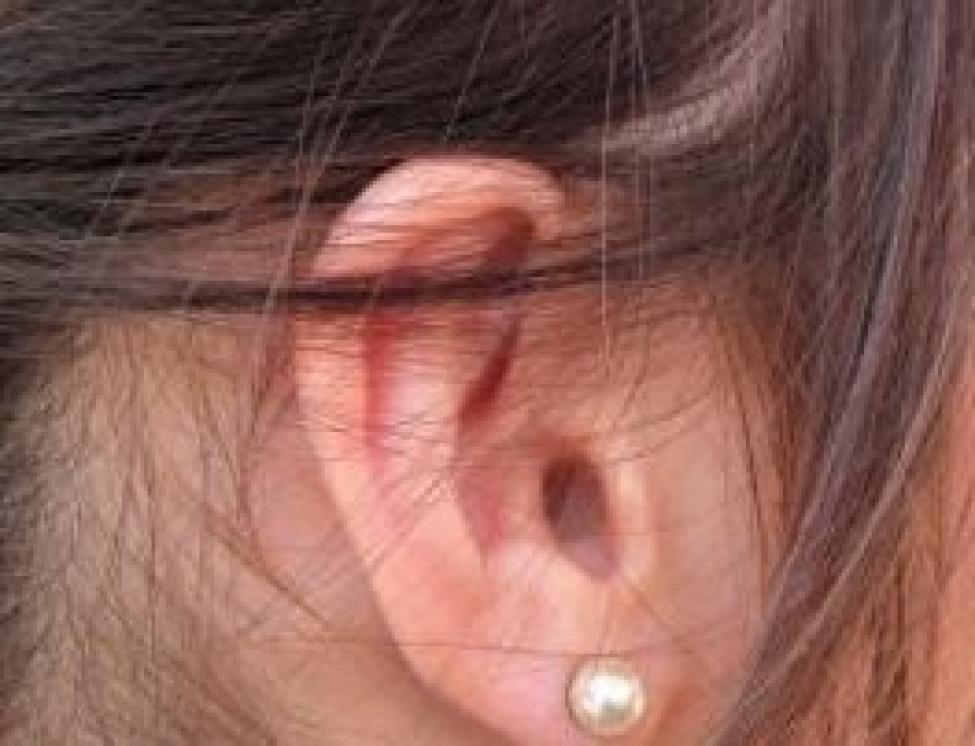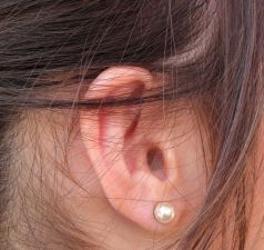 Womens Hair LossWomen suffer more intensely from hair loss than from men. However, a lot of progress has been made in diagnosing the underlying cause of hair loss specifically for women.
Womens Hair LossWomen suffer more intensely from hair loss than from men. However, a lot of progress has been made in diagnosing the underlying cause of hair loss specifically for women.
There can be a wide range of causes for the loss but one well-known cause is Polycystic Ovarian Syndrome (PCOS).
PCOS is known to impact nearly 60 per cent of women worldwide now have some degree of PCOS.
PCOS is a hormonal disorder which can definitely cause hair loss, a range of scalp and skin problems as well as leading to infertility. It’s even found among school children. PCOS is tied to excess androgen.
PCOS Diagnosis And Symptoms
Confirmation of PCOS is done through an ultra sound scan which shows multiple small cysts which are old unruptured follicles with eggs in both the ovaries. The abnormal hormonal ratio by increase in LH:FSH ratio more than one can be established by a lab test on day 2 of the cycle.
Known symptoms include, but are not limited to the following: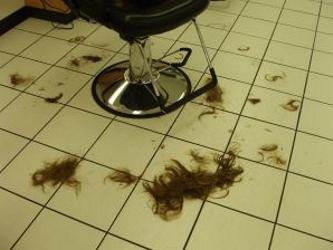 Clippings of hair on the floor
Clippings of hair on the floor
- Hair thinning, hair loss, flaky or irritate scalp
- Reduced stamina, lethargy, chronic fatigue
- Excessive weight gain with difficulty losing weight regardless of dietary measures
- Acne or frequent skin infections which might include fungal infections
- Dark color behind neck and underarms
- Irregular periods or late cycles
- Hirsuitsm in which male pattern hair growth occurs in women. This can include excessive hair on the face, chest, abdomen and legs
- Difficulty in conception or getting pregnant
- Frequent Miscarriages
- Reduced interest in sex (libido) and reduction in lubrication during intercourse
- Early incidence of diabetes, high BP and high cholesterol
- Medical Research Into PCOS
- Hair Follicle InfoGraphic
- Hair Follicle
Medical Research Into PCOS
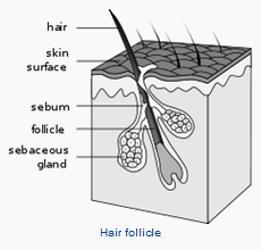 Hair FollicleResearch by Mount Sinai Hospital in New York, St. Mary’s Hospital, Imperial College and top British trichologist Philip Kingsley uncovered a ink between hair loss in women and PCOS as far back as 2000.
Hair FollicleResearch by Mount Sinai Hospital in New York, St. Mary’s Hospital, Imperial College and top British trichologist Philip Kingsley uncovered a ink between hair loss in women and PCOS as far back as 2000.
The research was based on a PCOS study which evaluated women with thinning hair. The researchers discovered that 72 per cent of women with thinning hair taking part in the study actually had PCOS. As a result of this studies researched believed that PCOS may cause hair follicles to literally decrease in size ultimately resulting in weaker, thinner and falling hair.
Researchers noted that other possible symptoms of PCOS may include a flaking or compromised scalp. The most common symptoms are irregular periods, weight gain, facial and chest hair growth as well as adult acne.
A High Protein Diet Can Help PCOS
According to Reuters Health, Danish researchers have determined that a diet high in the ratio of protein to carbohydrates can help women suffering from PCOS.
“Replacing carbohydrates with protein in ad libitum diets improves weight loss and improves glucose metabolism and seems to offer an improved dietary treatment of PCOS patients,” Dr Lone B. Sorensen told Reuters Health by email.
In an online paper in The American Journal of Clinical Nutrition, Dr Sorensen of the University of Copenhagen and colleagues note that most dietary interventions for PCOS have focused on energy restriction. Indeed, many women with the condition are obese.
Because the Danish team wanted to know whether replacing carbohydrates with protein might be helpful, they recruited 57 women and assigned them through rank minimization to eat either a standard or high-protein diet. Neither group had any kilojoules restriction.
The High-Protein Diet The Human Heart
The Human Heart
The high-protein diet provided more than 40% of energy from protein, 30% from fat and the remainder from carbohydrates. The standard diet derived less than 15% of energy from protein, 30% of energy from fat, and more than 55% from carbohydrates.
More than half the women dropped out over the course of the six-month study. Seven women left because of pregnancy; another 23 did so for other reasons, leaving 27 to be evaluated.
The high-protein diet produced a significantly higher weight loss than the standard diet (7.7 vs 3.3 kg). Women on the high-protein diet also lost more body fat (6.4 vs 2.1 kg), and had a significantly greater reduction in waist circumference.
The high-protein diet also led to greater decreases in glucose, which persisted after adjustment for weight changes. This positive effect was thus independent of weight loss.
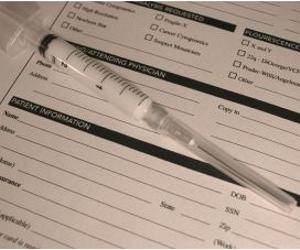 Lab TestsSumming up, Dr Sorensen said, “This study shows that it is not necessary for PCOS patients to follow energy-restricted diets because protein satiates so well that a high protein diet will induce a spontaneous reduction in energy intake.”
Lab TestsSumming up, Dr Sorensen said, “This study shows that it is not necessary for PCOS patients to follow energy-restricted diets because protein satiates so well that a high protein diet will induce a spontaneous reduction in energy intake.”
Summary
There is as yet no cure for PCOS, but experts who specialize in women’s hair loss issues have experienced positive results with hormonal treatments, nutrition and exercise.
Treatment goals are based on specific symptoms, be it hair loss, infertility, excessive hair growth, obesity, risk of heart disease or diabetes. Anti-androgens or laser techniques or electrolysis may reduce excessive hair growth and clear acne.
Some experts have noted there is also no guaranteed way to get hair which has already been lost to regrow. The only known way to minimize hair loss is to prevent it through early diagnosis and treatment.
If you’ve noticed an ongoing change in the condition of your hair or scalp and are troubled by other symptoms of PCOS, its worth visiting your primary physician for an accurate diagnosis through the tests referenced above.
Medications that stimulate ovulation can help women with PCOS become pregnant.
It’s important to be treated if PCOS exists. Why? More than 50 per cent of women with PCOS will have diabetes or pre-diabetes around the age of 40-50 years. Also, the risk of heart attack is 4 to 7 times higher in women with PCOS than women of the same age without PCOS. Why? women with PCOS are at greater risk of having high blood pressure and have high levels of LDL (bad) cholesterol and low levels of HDL (good) cholesterol.
SHARE THIS ARTICLE:
